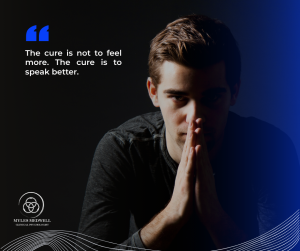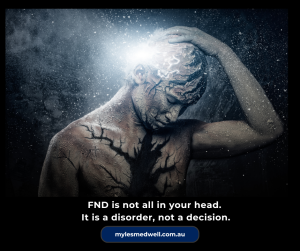Happy Birthday Friedrich Nietzsche
This week was Nietzsche’s birthday, and I’ve been sitting with one of his most unsettling ideas. According to this German Philosopher who became an influence to Sigmund Freud (the founder of psychoanalysis), we don’t really know ourselves. And not just because we haven’t tried hard enough, but because we can’t. Not fully.
For those of us working in psychoanalysis and psychology, this hits close to home. Nietzsche understood something that wouldn’t be “officially” discovered until Freud came along: we’re not in control of our own minds the way we think we are.
When Thoughts Show Up Uninvited
Descartes gave us that famous line: “I think, therefore I am.” It sounds solid, reassuring even. But Nietzsche poked a hole right through it. What if your thoughts don’t actually belong to you in the way you assume? What if they just… arrive? Like an unexpected guest at dinner?
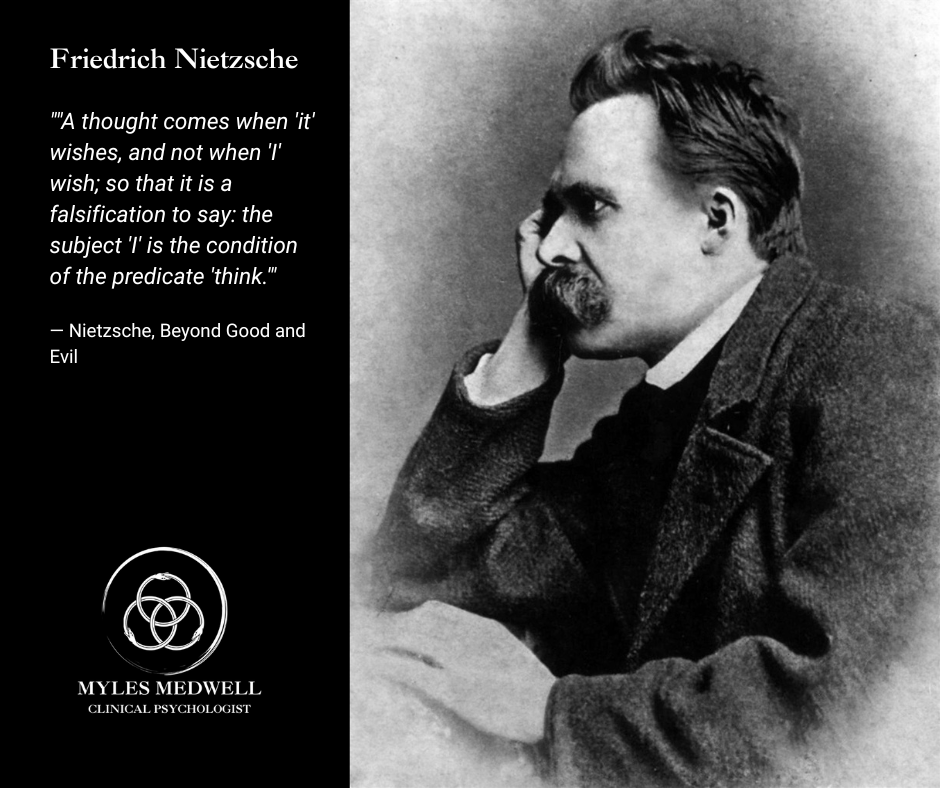
Think about it. Have you ever had a thought pop into your head completely out of nowhere? A memory you weren’t trying to recall, an anxiety that ambushed you, a creative idea that seemed to come from somewhere else entirely? That’s what Nietzsche was getting at. If thoughts come when they want to, not when you decide to think them, then who’s really in charge?
This is exactly what psychoanalysis discovered later. Freud formalized it, Lacan sharpened it, but Nietzsche saw it first: there’s something else going on beneath the surface. The “I” we think we are is not the whole story.
The Self We Don’t Know
When Nietzsche says “we are unknown to ourselves,” he’s not just pointing out that we’re forgetful or unobservant. It’s deeper than that. There are parts of us we genuinely cannot access directly, like our unconscious desires, buried memories, and patterns we repeat without understanding why.
In therapy, I see this all the time. People come in thinking they know exactly what the problem is, and often they’re partly right. But then something else emerges in the work. It may be a slip of the tongue, a recurring dream, a pattern they didn’t notice. That’s the unconscious speaking.
The goal isn’t to achieve total self-knowledge (that’s impossible). It’s to create space where those hidden parts can be heard. To get curious about the stranger within.
The Trap of Total Control
Here’s where modern psychology sometimes misses the mark. We live in a culture obsessed with optimization. We want all the life hacks, endless productivity tips, and countless strategies to control every aspect of our mental lives. Cognitive Behavioural Therapy (CBT) and similar approaches are genuinely helpful, don’t get me wrong. I use them in my Richmond practice all the time.
But they can feed into a dangerous illusion: that if you just try hard enough, you can master your mind completely. That anxiety, depression, or difficult emotions are just problems to be solved and then eliminated.
What I’ve learned from both Nietzsche and psychoanalysis is that this approach has limits. Some things can’t be controlled or “fixed.” And honestly? That’s okay. Sometimes the work is learning to live with the parts of ourselves that won’t be tamed.
What Therapy Actually Does
When clients come to see me in Richmond, they often want relief from anxiety, depression, or conditions like Functional Neurological Disorder (FND). They want answers. They want control.
What often happens instead is something subtler and more valuable. They start to realize that thoughts and feelings don’t always obey commands. The unconscious has its own logic, its own timing. Dreams don’t make sense. Symptoms appear without clear cause. Old patterns resurface.
Therapy doesn’t erase this messiness. It creates a relationship with it. A way of listening. A practice of curiosity rather than control.
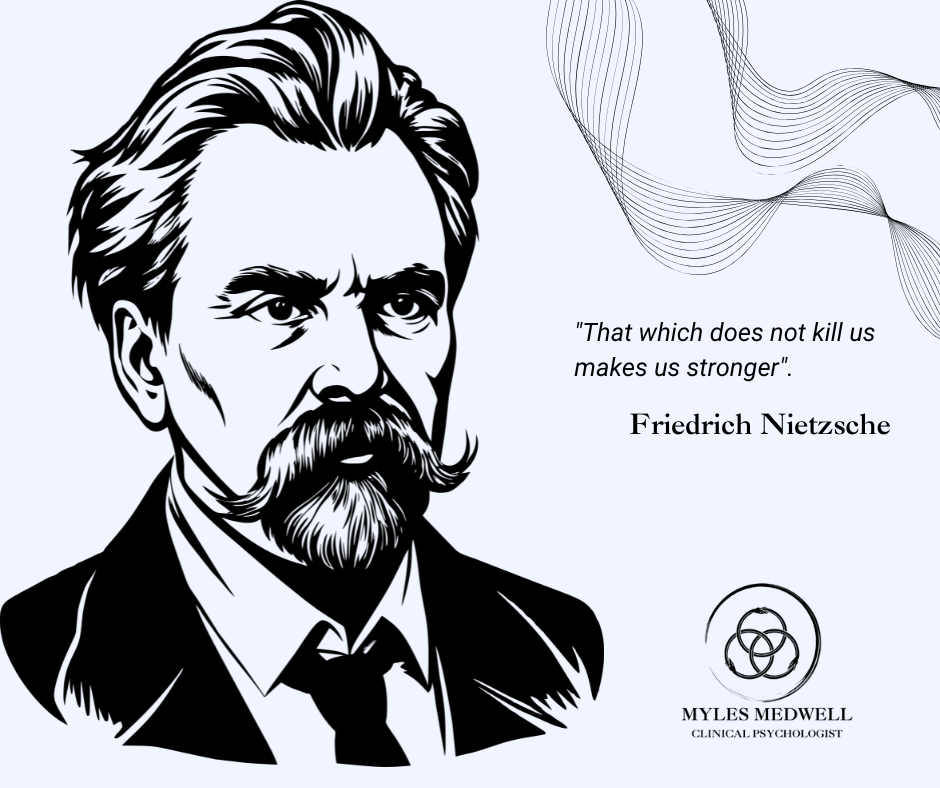
Why This Matters Now
Melbourne’s mental health landscape moves fast. People want solutions, and they want them quickly. There’s pressure to bounce back, to optimize, to function at peak performance.
But real transformation takes time. It requires sitting with uncertainty. It means accepting that you’ll never fully understand yourself. And that’s okay, it is not a failure.
In my practice, I try to hold both things at once: practical strategies for managing day-to-day challenges (CBT, Acceptance and Commitment Therapy, concrete skills), alongside the deeper, slower work of psychoanalysis. Both matter. Sometimes you need tools to get through the week. And sometimes you need to explore the depths.
Living with the Unknown
If we take Nietzsche seriously, that thoughts really do come when “they” wish, what does that mean for how we live?
Maybe it means letting go of the fantasy of total mastery. Maybe it means getting comfortable with surprise, with the mind’s unpredictability. This isn’t a bug in the system. It’s what makes creativity possible. It’s what allows for genuine change.
For clients, this shift can be liberating. Instead of “fixing” yourself like a broken machine, you’re entering into conversation with the parts of yourself you don’t fully know. The work becomes less about control and more about relationship. Knowing your own depths and accepting your own strangeness.
A Different Kind of Practice
What I offer in Richmond is different from quick-fix approaches. It’s for people who sense there’s more going on beneath the surface. Who want not just symptom relief but a deeper understanding. Who are willing to sit with questions that don’t have easy answers.
This is where Nietzsche and psychoanalysis meet: in the recognition that we are mysterious to ourselves, and that this mystery is not something to overcome but something to engage with.
The Stranger Within
On Nietzsche’s birthday, I’m reminded that the certainty we crave…the “I think, therefore I am”…has always been a bit of a comforting fiction. We are, in many ways, strangers to ourselves. Our thoughts have minds of their own.
But there’s something beautiful in that. If we knew everything, if we controlled everything, life would be flat. Mechanical. The unknown within us is what keeps things interesting, what allows for surprise and transformation.
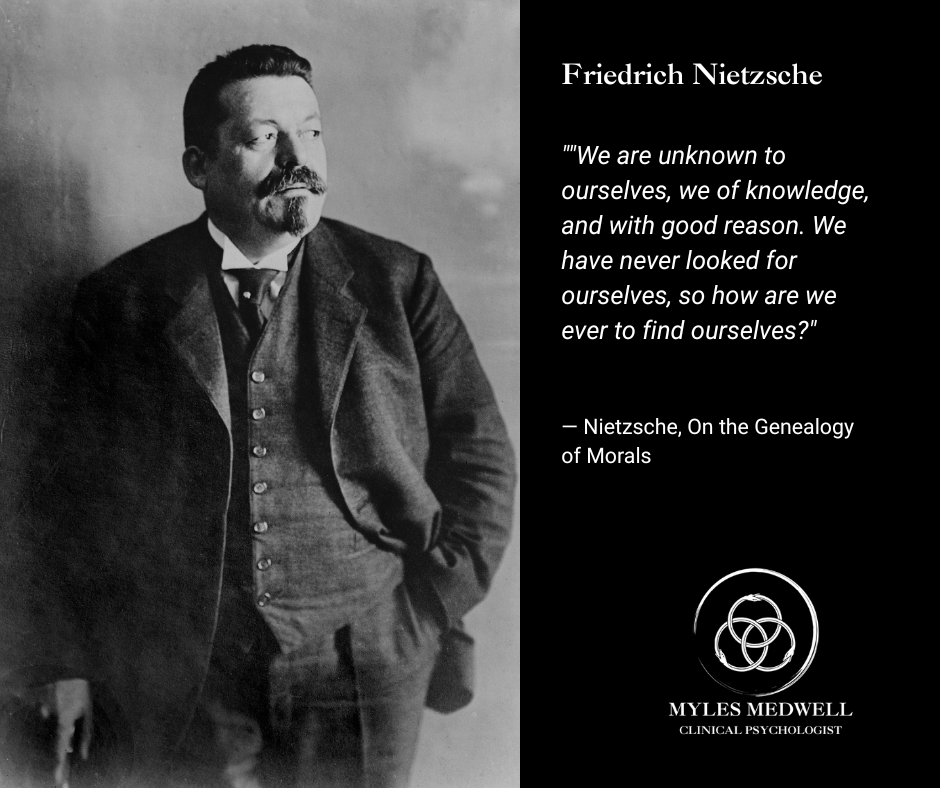
In therapy, the task isn’t to eliminate the unknown. It’s to listen to it, to work with it, to let it teach us something. That takes patience. It takes courage. But it’s worth it.
Because in the end, becoming more human doesn’t mean achieving perfect self-knowledge. It means learning to live with ourselves and even welcoming the parts of us that we’ll never fully grasp.
About the Author: Myles Medwell is a Clinical Psychologist based at 53 Erin Street, Richmond VIC 3121. He specialises in psychoanalysis, trauma therapy, psychological assessments, and Functional Neurological Disorder treatment. His approach integrates evidence-based methods with psychoanalytic depth, offering clients across Melbourne the opportunity to explore not just their symptoms, but their deeper selves. If you want to know more about Nietzsche’s influence on Psychoanalysis, you can read this paper by Tyger Latham, Psy.D.


